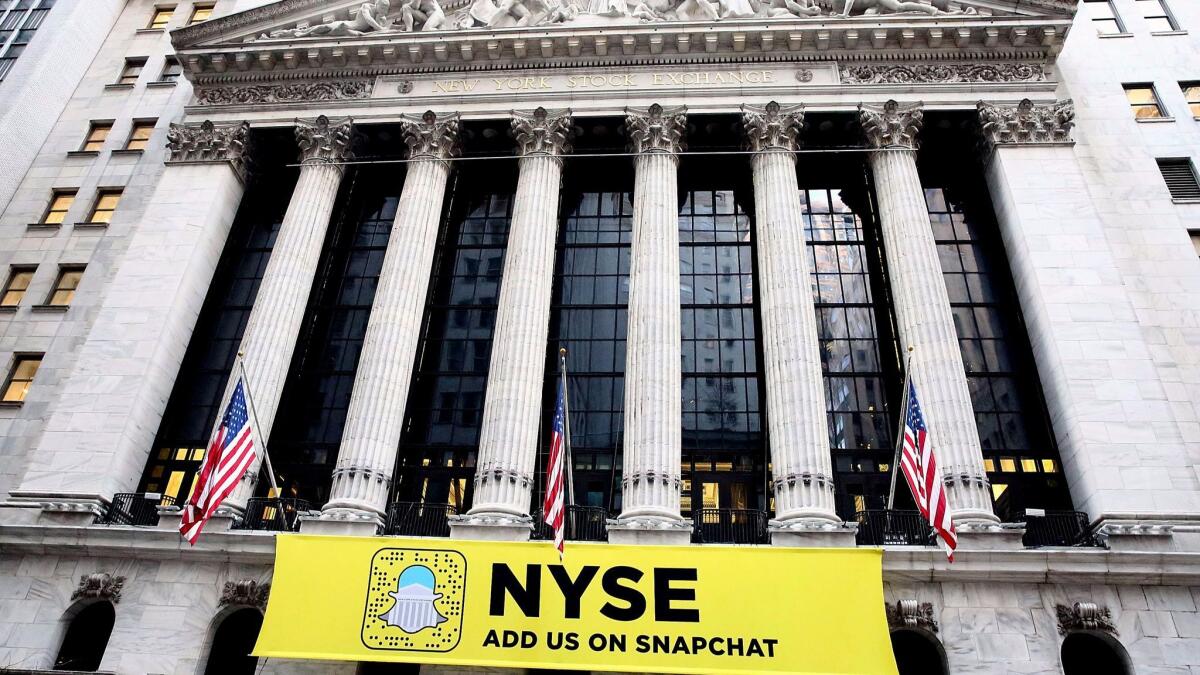At $17 a share, L.A. company behind Snapchat is worth nearly $24 billion

The Los Angeles company known for its Snapchat messaging app generated the largest initial public offering in Southern California history on Wednesday, raising at least $3.4 billion while valuing the firm at $23.8 billion.
Snap Inc.’s IPO is the most lucrative in the U.S. since online shopping company Alibaba raised $22 billion in 2014 and the biggest for a tech company since Facebook’s $16-billion haul in 2012. Facebook and Visa are the only California companies that brought in more cash than Snap through an IPO, according to FactSet data.
Mutual funds, pension offices and other investors paid $17 per share to be the first to hold Snap stock when it begins trading — if all goes as planned — on the New York Stock Exchange early Thursday under the symbol SNAP.
The company offered up about 15% of its outstanding shares and contemplated higher prices after receiving 10 times the demand as supply, according to a source familiar with the deal not authorized to comment on private discussions.
But Snap decided to leave money on the table. Starting slightly lower could ensure that prices climb in Thursday’s trading because strong first-day increases are often viewed as a positive sign. And a lower price helped court preferred investors — ones likely to hold onto shares for longer terms.
Attracting shareholders that are in for the long haul could counteract severe ups and downs in the company’s share price. Snap also is barring a quarter the shares sold in the IPO from being re-sold until next year, another move aimed at limiting volatility.
Snap could face turbulence in its share price because it doesn’t generate profit and has warned that Snapchat user growth and ad revenue could be unsteady. In addition, Facebook, Apple, Google and other tech giants represent formidable competition.
But in marketing the company’s stock, Snap has positioned Chief Executive Evan Spiegel as a visionary with captivating and bankable ideas for augmenting how cameras work both in terms of hardware and software.
“The revenue models are at the very, very beginning, and it looks like they are long way from profitability,” said Rob Sanderson, who analyzes tech stocks for MKM Partners. “But they are coming out with an huge valuation because there’s an enormous opportunity” in mobile advertising and content.
Advertisers are optimistic about the potential of Snapchat, which has 158 million daily users, most of them in their teens or early adulthood.
There’s “encouraging early activity, and the demographic Snapchat serves is a high priority for advertisers,” Sanderson said.
Snap’s IPO has spurred great interest because few tech companies went public last year amid a shaky market, and none have debuted on the stock market this year. It’s also the first to go public among a class of companies, including Uber, Airbnb and Pinterest, that have been valued at more than $10 billion while still privately held.
Snap will get about $2.5 billion in cash from the IPO, with much of it going toward bolstering its 2,000-employee workforce and experimenting with new technology. The company would receive an additional $260 million if its bankers exercise an option in the next 30 days to purchase extra shares at the IPO price.
The rest of money will go to Spiegel, his co-founder Bobby Murphy and venture capital firms that invested in Snap over the last six years since its founding out of a Stanford University dorm in 2011.
Spiegel, a Los Angeles native, and Murphy, who grew up near Berkeley, together will have the greatest ownership and voting power in the company.
Twitter: @peard33
ALSO
What to buy (and skip) in March
Uber’s recent controversies come at a price: public loyalty
State to step up inspections at hospitals with high infection rates




